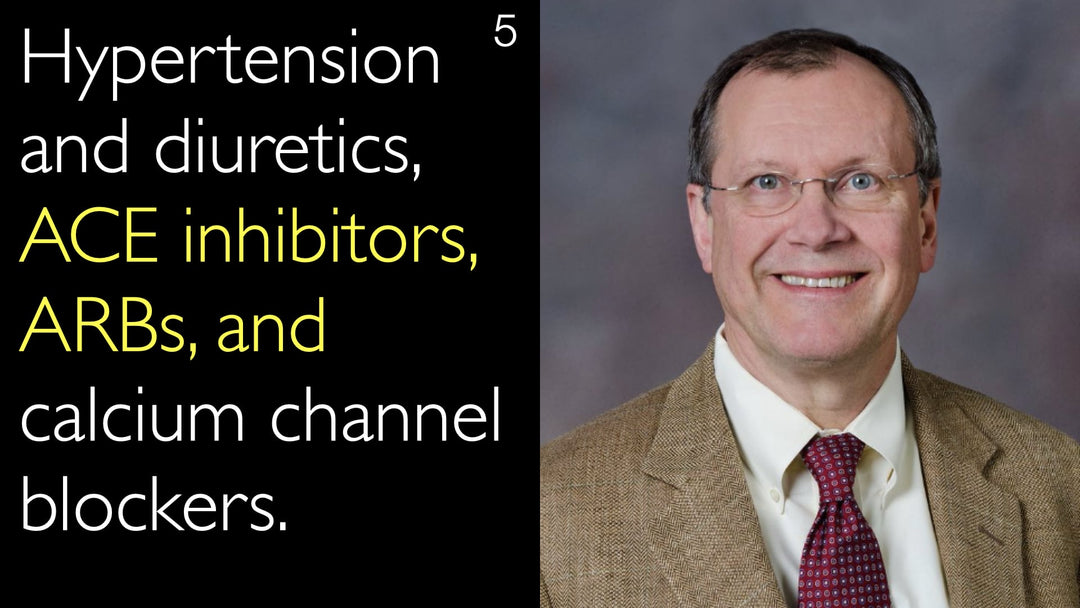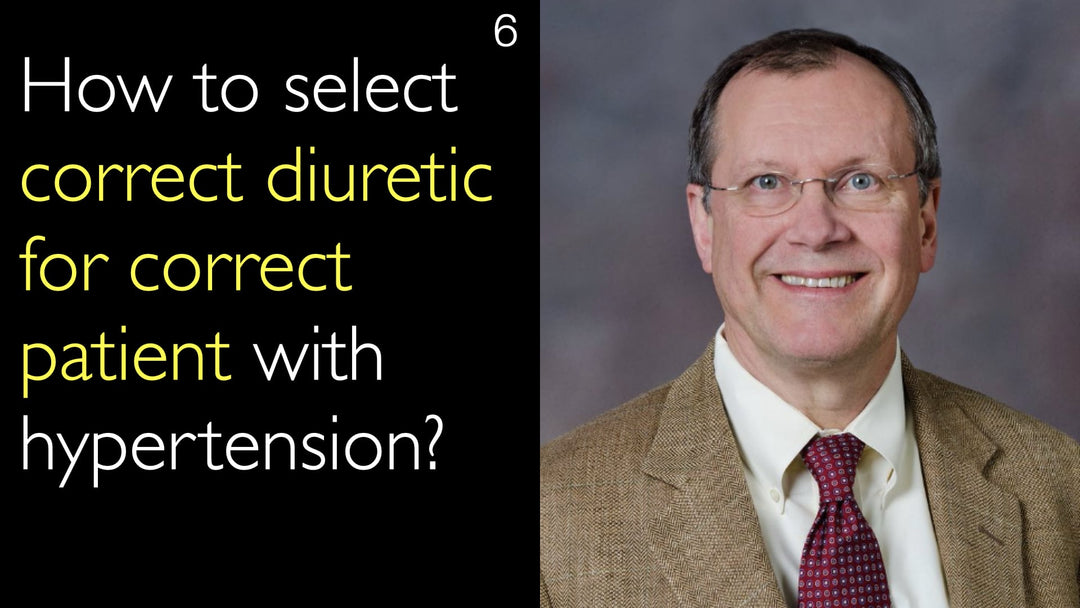Leading expert in hypertension and kidney disease, Dr. David Ellison, MD, explains the modern use of diuretics and other first-line medications for high blood pressure. He details the benefits of ACE inhibitors, ARBs, calcium channel blockers, and thiazide diuretics. Dr. David Ellison, MD, emphasizes that combination therapy with multiple drug classes is often necessary. The primary goal is effective blood pressure control with a regimen the patient can tolerate.
Optimal Hypertension Treatment with Diuretics, ACE Inhibitors, ARBs, and Calcium Channel Blockers
Jump To Section
- First-Line Hypertension Drugs
- ACE Inhibitors and ARBs
- Calcium Channel Blockers
- Combination Therapy Benefits
- Individualized Treatment Approach
- Full Transcript
First-Line Hypertension Drugs
Dr. David Ellison, MD, discusses the evolution of first-line hypertension therapy. For decades, diuretics were the primary treatment. Recent guidelines now position ACE inhibitors, angiotensin receptor blockers (ARBs), and calcium channel blockers at the forefront. Dr. Ellison references the pivotal ALLHAT study, which compared these drug classes. The study found thiazide diuretics, ACE inhibitors, and calcium channel blockers were approximately equally effective at lowering blood pressure.
Thiazide diuretics demonstrated a specific benefit in preventing heart failure. Dr. Anton Titov, MD, explores these findings with Dr. David Ellison, MD. Dr. David Ellison, MD, confirms that the choice of first-line agent often depends on the patient's specific clinical situation.
ACE Inhibitors and ARBs
ACE inhibitors and ARBs are frequently chosen as initial therapy for hypertension. Dr. David Ellison, MD, explains their mechanism of action involves reducing aldosterone levels. Aldosterone can have adverse effects on the body independent of blood pressure. These medications offer special kidney-protective effects for patients with hypertension.
They change renal perfusion and lower blood pressure within the kidneys themselves. All recent clinical guidelines recommend ACE inhibitors or ARBs as first-line therapy, especially if kidney disease is present. Dr. Anton Titov, MD, and Dr. Ellison discuss their central role in modern hypertension management.
Calcium Channel Blockers
Calcium channel blockers are another excellent class of first-line hypertension drugs. Dr. David Ellison, MD, notes that large randomized controlled trials show they improve long-term outcomes. Both calcium channel blockers and diuretics have been proven to reduce the number of strokes and help people live longer. However, these medications can have specific side effects that require management.
A common issue is peripheral edema, which can be troubling for patients. Dr. David Ellison, MD, also highlights a renal consideration. Calcium blockers open blood vessels leading into the kidney, which can potentially increase glomerular pressure. This effect is the opposite of what ACE inhibitors and ARBs do, and may predispose some patients to worsening kidney disease.
Combination Therapy Benefits
Most patients with sustained hypertension will require treatment with more than one drug class. Dr. David Ellison, MD, emphasizes that combination therapy is used almost daily in clinical practice. He cites a significant trial that compared a quarter-dose combination of four different antihypertensive drugs to a single maximal dose of one drug.
The low-dose, multi-drug approach was just as effective at controlling blood pressure. Crucially, the side effects were less with the tiny doses of four drugs than with a high dose of one drug. This strategy allows for effective hypertension control while minimizing adverse effects for the patient.
Individualized Treatment Approach
Dr. David Ellison, MD, states that many debates over the single best first-line drug have faded. The consensus now is that effective blood pressure control is the primary goal. Whether a physician starts with a diuretic, calcium blocker, ACE inhibitor, or ARB is less important than achieving a lower blood pressure. There are specific clinical situations where one drug is clearly indicated over another.
Dr. David Ellison, MD, concludes that the regimen must be affordable, effective, and free of significant side effects. Dr. Anton Titov, MD, discusses how all these drug classes are now relatively inexpensive. This allows physicians to tailor a treatment plan that the patient can tolerate long-term, which is the ultimate key to success in managing hypertension.
Full Transcript
Dr. Anton Titov, MD: Diuretics were solid first-line drugs to treat hypertension for many decades. In recent years, however, ACE inhibitors, angiotensin receptor blockers (ARBs), and calcium channel blockers have been pushed to the frontline hypertension therapy. What is the state of the art in the use of diuretics to treat hypertension today, and how to correctly combine diuretics with other classes of medications to treat hypertension?
Dr. David Ellison, MD: For many years, there have been very acrimonious debates in the medical literature, spilling over into the popular press, about which type of diuretic was the best to use for hypertension as first-line therapy. Many of us think that the best data still come from the ALLHAT study I mentioned, which compared an ACE inhibitor, a calcium blocker, and a thiazide diuretic as first-line therapy for hypertension.
All of them were approximately equally able to lower blood pressure. The thiazide diuretics did have the benefit I mentioned of seeming to prevent heart failure. But it's very clear that in other situations, we would start first with a different drug. The two other drugs that we often turn to are an ACE inhibitor or an angiotensin receptor blocker.
I mentioned before that we think aldosterone can have adverse or bad effects on the body independent of blood pressure. Many times we like to reduce the aldosterone levels, and both ACE inhibitors and angiotensin receptor blockers can do that. In addition, it seems pretty clear that ACE inhibitors and angiotensin receptor blockers have a special effect to protect the kidneys from high blood pressure.
They change the way the kidneys treat the kidney blood perfusion and lower the blood pressure in the kidneys as well as throughout the body.
Dr. David Ellison, MD: So, in people with kidney problems, those are clearly the first-line drugs to treat hypertension if we know there is kidney disease present. All recent guidelines recommend ACE inhibitors or ARBs as first-line therapy. That said, calcium blockers are also excellent drugs. If you look at the drugs, they have been shown in large randomized controlled trials to actually improve long-term outcome.
It's the calcium blockers and the diuretics that both have been shown to reduce the number of strokes and have people live longer. There's probably less data in terms of run-of-the-mill hypertension for ACE inhibitors and ARBs. I don't think it's because ACE inhibitors and ARBs are not good drugs. It's just that there's less data.
But calcium blockers are excellent drugs as well. They have their own side effects, one of which is that they do tend to cause edema that can be troubling for patients. As a kidney doctor, we also worry a little bit because they tend to do the opposite to kidney blood flow that ACE inhibitors and ARBs do.
Calcium blockers open up the blood vessels leading into the kidney and can increase glomerular blood pressure.
Dr. David Ellison, MD: So, in some situations, that may predispose to worsening of kidney disease. In fact, we really combine all these drugs almost every day. Most patients with sustained hypertension are going to need more than one class of drugs. There's a very nice trial that combined quarter (25%) doses of four different antihypertensive drugs and compared it to a single maximal dose of one drug.
It showed that the 'lower dose, several drugs' approach was just as effective with tiny doses of four drugs. But the side effects were less with the tiny doses of four drugs than they were with a high dose of one drug. Most patients with hypertension are going to need combined therapy.
We use all three classes of drugs all the time. Many debates about which drug to use have faded. Whether you choose to start with a diuretic, or start with a calcium blocker, or start with an ACE inhibitor or ARB, that's not as important as getting the blood pressure down.
Dr. David Ellison, MD: So, I think the consensus has arisen that it is really getting the blood pressure down. There are certain situations where one or the other drug is clearly indicated. But in most situations, your primary goal has to be to control the blood pressure with whatever the patient can tolerate.
Also, I would say all these classes of drugs now are pretty inexpensive.
Dr. David Ellison, MD: So, we should be able to give the patient a regimen that is both affordable, effective, and also side effect free. I think that's where I am in this right now.







